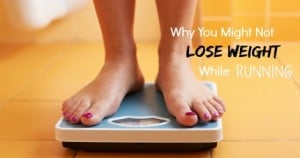Race day is coming.
You have put in the hours, followed your marathon training schedule exactly, and made it through days you were so tired you could barely make it up the stairs to go to bed.
But now you want to make sure you do not do anything to mess it up, and this is usually around the time our minds start to plague us with doubts.
And you start to think that maybe you can shave a few more seconds for optimal racing if you reach your ideal running weight.
You’ve probably heard the rule of thumb when it comes to excess weight:
“Every pound extra is one second per mile.”
Something this simple seems like it can’t possibly be accurate, but it does raise the broader issue of race weight.
You might be wondering:
What is my ideal race weight?
Is there an ideal body fat percentage for runners?
What is my ideal weight for my body type?
Today, we are going to look at what the scientific research has found about ideal race weight for runners; the pros and cons of trying to lose weight in the few weeks before a big race, and how we can be prepared for race day regardless.
Why Do Runners Want to Lose Weight Before a Race?
The most basic argument in favor of cutting weight comes from a car analogy:
If you put the same engine in a smaller car, the car will go faster—there’s less excess weight, and thus the same power output can carry you further or faster.
Reaching an ideal weight for runners means faster running
Scientific research seems to back up this claim:
A 2007 study by Lennart Teunissen, Alena Grabowski, and Rodger Kram at the University of Colorado Boulder investigated a similar case of this idea.1
In the study, the researchers experimentally reduced and increased body weight in a group of experienced male runners by using a clever setup involving a treadmill, a body harness, and a ceiling-mounted pulley system.
One purpose of the study was to identify whether changes in body weight or body mass were more significant.
What does that mean?
In other words, does most of the metabolic cost of running come from supporting your weight against the force of gravity, or overcoming the inertia from the mass of your limbs?
Teunissen, Grabowski, and Kram found that the former was the case:
Approximately three quarters of the total energetic cost of running comes from just supporting your body weight.
For every one percent reduction body weight, the energy cost associated with running drops by about 0.8%.
For each one percent increase in body weight, energy costs increased by about 1.3%.
Does ideal race weight for runners mean a higher VO2 Max?
This trend gives credence to the “engines and bodies” theory, as does some more basic math on oxygen consumption while running.
You’ve likely heard a good bit about VO2 max, or maximal oxygen consumption—the higher your VO2 max is, the faster you can run, all else being equal.
But, consider this:
One less-discussed factor that profoundly impacts your VO2 max is simply your body mass.
VO2 max is measured in milliliters of oxygen consumed per minute per kilogram of body mass—if all your oxygen energy systems stay the same and you shave off a few pounds, your VO2 max automatically goes up.2
Sounds pretty great.
Can improving really be this easy?
Well, no.
There are some important limitations to consider.
Nab Our FREE 4-part Weight Loss Email Course
You’ll learn the science behind losing weight and still running well so you can understand the “why” of weight loss for long-term success.
Lessons include why simply running more and eating less won’t help you lose weight, why your weight fluctuates each day, and the best way to distribute calories throughout your day. Plus more…
Could Your Ideal Race Weight Sabotage Your Race?
Reaching your optimal body weight is not as easy in the real world as it is in a lab.
To reduce their subjects’ apparent body mass, all Teunissen, Grabowski, and Kram had to do was turn a few knobs on their lab apparatus.
If you want to actually change your body weight, you need to reduce your energy consumption and/or increase your energy expenditure, and hope that you mostly shed fat, not muscle, while doing so.
On the way to reaching ideal body weight, runners are losing other parts too
As reported in a 2008 study by Samuel Mettler, Nigel Mitchell, and Kevin Tipton in the United Kingdom, athletes who try to reduce their body mass often find that they lose muscle mass in addition to fat mass when they diet, which can have negative impacts on performance.3
Getting back to the car analogy, we’re losing a few parts of the engine when we move it to the smaller car.
But, consider this:
One way to combat the reduction in performance is to increase protein intake.
Mettler, Mitchell, and Tipton’s study found that athletes who consumed a diet containing 35% of their energy from protein, maintained muscle mass better than those on a 15% protein diet during a four-week weight loss period.
Your ideal running weight could leave you injured or hitting the wall in your race
Other evidence points to additional hazards of being in negative energy balance while training hard.
Research by Cathy Zanker and Ian Swaine found that distance runners who burned more calories than they took in had lower levels of blood markers of bone and collagen synthesis.4
They interpreted this as evidence that runners might be at a higher risk for bone and tendon injuries during periods of low caloric intake.
For female runners, your optimal race weight could risk your long term health
The risks are greater for female runners, where low caloric intake can disrupt the menstrual cycle, which alters hormones associated with bone growth as well.
Absent or irregular menstrual cycles have been associated with an increased risk of stress fractures in female runners, and being underweight increases risk as well.5, 6
Is Striving for Your Ideal Race Weight Worth it?
Considering the effects of your weight on your race times is more complicated than trying to fit a bigger engine into a smaller car.
There’s a complex balancing act among fat mass, muscle mass, overall weight, and recovery.
For most runners, you want to reduce body fat and have the right amount of muscle mass, finding out what your ideal running weight can be difficult.
Even if you get to your ideal running weight by height, you need the right body composition too.
On top of all of that, you need to make sure you’re not undermining your body’s ability to recover from workouts and repair the damage you do to your bones and tendons.
Remember, we found that more weight does not lead to more injuries, but not fueling your body correctly very quickly puts you at a much higher risk of injuries.
If you have had multiple injuries in a row, and you are sick and tired of ending up injured from your training or overtrained, there is a very good chance it could be because you are not eating enough to allow your body to recover.
As with many things in training, losing weight gradually is best.
While trying to lose weight, increase the relative amount of protein in your diet; this should help stave off any excessive muscle mass losses.
Here’s the deal:
When you do cut weight, it’s also very important to take a “down week” of dieting every 3-4 weeks where you maintain normal energy balance, just like you might take a “down week” of lower mileage to give your body a chance to recover and to repair itself.
What’s the bottom line?
Losing weight is something that should probably be done early in your training cycle, instead of right before your most important race.
That’s when you want to be well-recovered and give yourself the best chance of reaching the starting line injury-free!
You are better off following our nutrition guidelines during your marathon taper, to be fueled up, and ready to race your best.
Would you rather run fast and feel strong or lose a few pounds that most people would never notice anyway?
Only you know the answer to that one.




